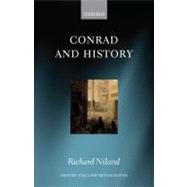Conrad and History
, by Niland, Richard- ISBN: 9780199580347 | 0199580340
- Cover: Hardcover
- Copyright: 5/2/2010
This book examines the philosophy of history and the subject of the nation in the literature of Joseph Conrad. It explores the importance of nineteenth-century Polish Romantic philosophy in Conrad's literary development, arguing that the Polish response to Hegelian traditions of historiography in nineteenth-century Europe influenced Conrad's interpretation of history. After investigating Conrad's early career in the context of the philosophy of history, the book analysesNostromo(1904),The Secret Agent(1907), andUnder Western Eyes(1911) in light of Conrad's writing about Poland and his sustained interest in the subject of national identity. Conrad juxtaposes his belief in an inherited Polish national identity, derived from Herder and Rousseau, with a sceptical questioning of modern nationalism in European and Latin American contexts.Nostromopresents the creation of the modern nation state of Sulaco;The Secret Agentexplores the subject of 'foreigners' and nationality in England; whileUnder Western Eyesconstitutes a systematic attempt to undermine Russian national identity. Conrad emerges as an author who examines critically the forces of nationalism and national identity that troubled Europe throughout the nineteenth century and in the period before the First World War. This leads to a consideration of Conrad's work during the Great War. In his fiction and newspaper articles during the war, Conrad found a way of dealing with a conflict that made him acutely aware of being sidelined at a turning point in both modern Polish and modern European history. Finally, this book re-evaluates Conrad's late novelsThe Rover(1923) andSuspense(1925), a long-neglected part of his career, investigating Conrad's sustained treatment of French history in his last years alongside his life-long fascination with the cult of Napoleon Bonaparte.







